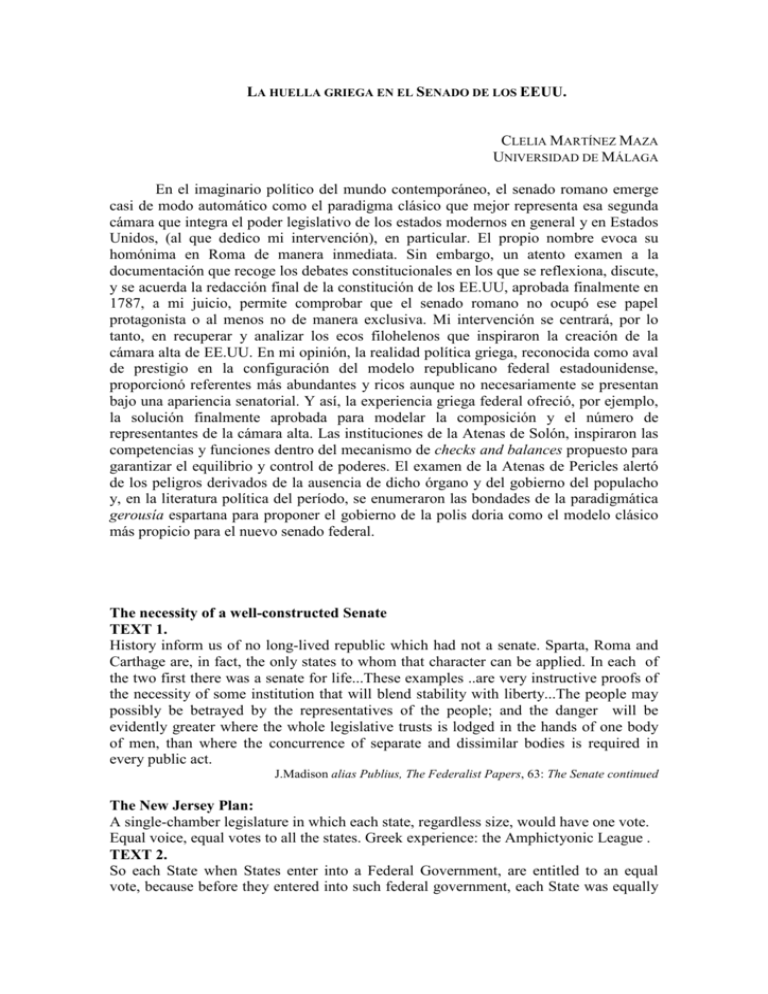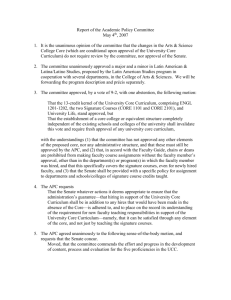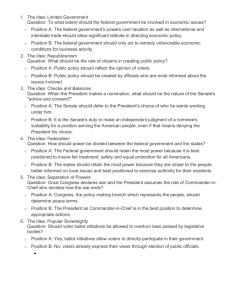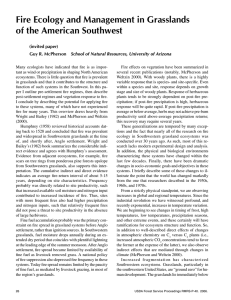En el imaginario político del mundo contemporáneo, el senado
advertisement

LA HUELLA GRIEGA EN EL SENADO DE LOS EEUU. CLELIA MARTÍNEZ MAZA UNIVERSIDAD DE MÁLAGA En el imaginario político del mundo contemporáneo, el senado romano emerge casi de modo automático como el paradigma clásico que mejor representa esa segunda cámara que integra el poder legislativo de los estados modernos en general y en Estados Unidos, (al que dedico mi intervención), en particular. El propio nombre evoca su homónima en Roma de manera inmediata. Sin embargo, un atento examen a la documentación que recoge los debates constitucionales en los que se reflexiona, discute, y se acuerda la redacción final de la constitución de los EE.UU, aprobada finalmente en 1787, a mi juicio, permite comprobar que el senado romano no ocupó ese papel protagonista o al menos no de manera exclusiva. Mi intervención se centrará, por lo tanto, en recuperar y analizar los ecos filohelenos que inspiraron la creación de la cámara alta de EE.UU. En mi opinión, la realidad política griega, reconocida como aval de prestigio en la configuración del modelo republicano federal estadounidense, proporcionó referentes más abundantes y ricos aunque no necesariamente se presentan bajo una apariencia senatorial. Y así, la experiencia griega federal ofreció, por ejemplo, la solución finalmente aprobada para modelar la composición y el número de representantes de la cámara alta. Las instituciones de la Atenas de Solón, inspiraron las competencias y funciones dentro del mecanismo de checks and balances propuesto para garantizar el equilibrio y control de poderes. El examen de la Atenas de Pericles alertó de los peligros derivados de la ausencia de dicho órgano y del gobierno del populacho y, en la literatura política del período, se enumeraron las bondades de la paradigmática gerousía espartana para proponer el gobierno de la polis doria como el modelo clásico más propicio para el nuevo senado federal. The necessity of a well-constructed Senate TEXT 1. History inform us of no long-lived republic which had not a senate. Sparta, Roma and Carthage are, in fact, the only states to whom that character can be applied. In each of the two first there was a senate for life...These examples ..are very instructive proofs of the necessity of some institution that will blend stability with liberty...The people may possibly be betrayed by the representatives of the people; and the danger will be evidently greater where the whole legislative trusts is lodged in the hands of one body of men, than where the concurrence of separate and dissimilar bodies is required in every public act. J.Madison alias Publius, The Federalist Papers, 63: The Senate continued The New Jersey Plan: A single-chamber legislature in which each state, regardless size, would have one vote. Equal voice, equal votes to all the states. Greek experience: the Amphictyonic League . TEXT 2. So each State when States enter into a Federal Government, are entitled to an equal vote, because before they entered into such federal government, each State was equally free and equally independent. That adequate representation of men formed into a State government, consists in each man having an equal voice either personally, or if by representatives.....in the amphyctionic confederation of the Grecian cities, each city however different in wealth, strength, and other circumstances, sent the same number of deputies, and had each an equal voice in every thing that related to the common concerns of Greece. Luther Martin, Baltimore Maryland Gazette, January 1, 1788 The Virginia Plan: A bicameral legislature in which each state would be represented in proportion to their quotas of contribution or to the number of free inhabitants. Greek experience: Lycian League TEXT 3. Mr. Ellsworth had also erred in saying that no instance had existed in which confederated States had not retained to themselves a perfect equality of suffrage. ...I reminded Mr. E. of the Lycian confederacy, in which the component members had votes proportioned to their importance, and which Montesquieu recommends as the fittest model for that form of Government. Records of the Federal Convention, June 28, 1787 TEXT 4. The next confederacy, which claims our attention, is that of the Lycians. In this republick, the just rights of suffrage were observed with great accuracy. It was an association of twenty three towns. These were arranged into three classes, in proportion to their strength. In the first class, six states were included. The numbers of which the second and third classes were composed, are uncertain. Every city had its own magistrates and government, and managed its own internal affairs. But all, uniting together, formed only one common republick, and had one common council. In that council, they deliberated and resolved concerning war, concerning peace, concerning alliances; in a word, concerning the general interests and welfare of the Lycians. The towns of the first class had three votes; the towns of the second class had two votes; and the towns of the third class had one vote, in the common council. In the same proportion, they contributed to the publick expenses, and appointed the publick magistrates of the union...This republick continued till the Romans, by their extending conquests, overpowered every thing in Asia... “Was I to give,” says the celebrated Montesquieu, “the model of an excellent confederate republick, I would select that of Lycia.” The happy experience, however, of the United States, has evinced, that, even upon that model, immense improvements have been made. J. Wilson, “Of a Man as a Member of a Confederation”, Lectures in Law, 1790-1792. The “Connecticut Compromise”, “Great Compromise” or “Sherman’s Compromise” (July 16, 1787) A bicameral legislature with proportional representation in the lower house (Virginia Plan). The upper house is weighted equally between the states. Each state would have two representatives in the Senate(N. Jersey Plan). Greek experience: the Amphictyonic League. The Role of the Senate: Check on the House of Representatives. The confirmation of the President’s appointment of federal officers, the advice and consent to treaties entered into by the United States. Greek Experience: Achaean league. The Senate’s virtues as an institution TEXT 5. “I shall not scruple to add, that such an institution may be sometimes necessary as a defense to the people against their own temporary errors and delusions... In these critical moments, how salutary will be the interference of some temperate and respectable body of citizens, in order to check the misguided career, and to suspend the blow meditated by the people against themselves, until reason, justice, and truth can regain their authority over the public mind? What bitter anguish would not the people of Athens have often escaped if their government had contained so provident a safeguard against the tyranny of their own passions? Popular liberty might then have escaped the indelible reproach of decreeing to the same citizens the hemlock on one day and statues on the next”. J.Madison alias Publius, The Federalist Papers, 63: The Senate continued TEXT. 6.A. This piece of history (scl. Amphictyonic league) proves at once the inefficiency of the union, the ambition and jealousy of its most powerful members, and the dependent and degraded condition of the rest. The smaller members, though entitled by the theory of their system to revolve in equal pride and majesty around the common center, had become, in fact, satellites of the orbs of primary magnitude. Publius (= A. Hamilton, J. Madison), The Federalist, 18: The Insufficiency of the Present Confederation to Preserve the Union (continued) TEXT.6.B. The Achaean league, as it is called, was another society of Grecian republics, which supplies us with valuable instruction... The senate, in which they were represented, had the sole and exclusive right of peace and war; of sending and receiving ambassadors; of entering into treaties and alliances; of appointing a chief magistrate or praetor, as he was called, who commanded their armies, and who, with the advice and consent of ten of the senators, not only administered the government in the recess of the senate, but had a great share in its deliberations, when assembled. Publius (= A. Hamilton, J. Madison), The Federalist, 18: The Insufficiency of the Present Confederation to Preserve the Union (continued)











